Antibody data
- Antibody Data
- Antigen structure
- References [0]
- Comments [0]
- Validations
- Western blot [1]
- Immunocytochemistry [1]
- Immunoprecipitation [1]
- Immunohistochemistry [4]
- Other assay [1]
Submit
Validation data
Reference
Comment
Report error
- Product number
- PA5-118225 - Provider product page

- Provider
- Invitrogen Antibodies
- Product name
- Bit1 Polyclonal Antibody
- Antibody type
- Polyclonal
- Antigen
- Other
- Reactivity
- Human
- Host
- Rabbit
- Isotype
- IgG
- Vial size
- 100 μL
- Storage
- -20°C, Avoid Freeze/Thaw Cycles
No comments: Submit comment
Supportive validation
- Submitted by
- Invitrogen Antibodies (provider)
- Main image
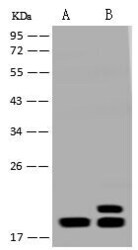
- Experimental details
- Western Blot using Bit1 Polyclonal Antibody (Product # PA5-118225) at 1:2,000 dilution. Lane A: Jurkat Whole Cell Lysate, Lane B: HepG2 Whole Cell Lysate. Lysates/proteins at 30 μg per lane. Secondary antibody: Goat Anti-Rabbit IgG (H+L)/HRP at 1:10,000 dilution. Developed using the ECL technique. Performed under reducing conditions. Predicted band size: 19 kDa. Observed band size: 19 kDa. (We are unsure of the identity of these extra bands).
Supportive validation
- Submitted by
- Invitrogen Antibodies (provider)
- Main image
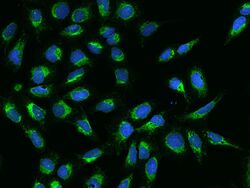
- Experimental details
- Immunofluorescence staining of Bit1 in U2OS cells. Cells were fixed with 4% PFA, permeabilzed with 0.1% Triton X-100 in PBS, blocked with 10% serum, and incubated with Bit1 Polyclonal Antibody (Product # PA5-118225, 1:200) at 4°C overnight. Then cells were stained with the Alexa Fluor®488-conjugated Goat Anti-rabbit IgG secondary antibody (green) and counterstained with DAPI (blue). Positive staining was localized to cytoplasm.
Supportive validation
- Submitted by
- Invitrogen Antibodies (provider)
- Main image
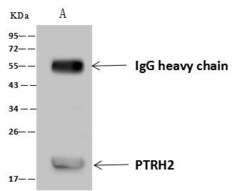
- Experimental details
- Bit1 Immunoprecipitation using: Lane A: 0.5 mg Jurkat Whole Cell Lysate 4 µL with Bit1 Polyclonal Antibody (Product # PA5-118225) and 60 μg of Immunomagnetic beads Protein A/G. Primary antibody: Bit1 Polyclonal Antibody, at 1:100 dilution. Secondary antibody: Goat Anti-Rabbit IgG (H+L) /HRP at 1:10,000 dilution. Developed using the ECL technique. Performed under reducing conditions. Predicted band size: 19 kDa. Observed band size: 19 kDa.
Supportive validation
- Submitted by
- Invitrogen Antibodies (provider)
- Main image
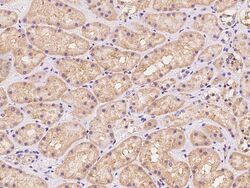
- Experimental details
- Immunohistochemical staining of human Bit1 in human kidney with Bit1 Polyclonal Antibody (Product # PA5-118225, 1:500 dilution, formalin-fixed paraffin embedded sections).
- Submitted by
- Invitrogen Antibodies (provider)
- Main image
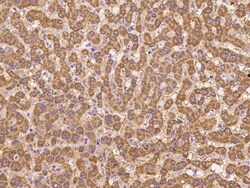
- Experimental details
- Immunohistochemical staining of human Bit1 in human liver with Bit1 Polyclonal Antibody (Product # PA5-118225, 1:500 dilution, formalin-fixed paraffin embedded sections).
- Submitted by
- Invitrogen Antibodies (provider)
- Main image
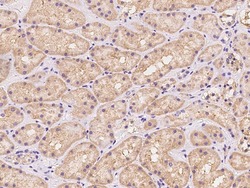
- Experimental details
- Immunohistochemical staining of human Bit1 in human kidney with Bit1 Polyclonal Antibody (Product # PA5-118225, 1:500 dilution, formalin-fixed paraffin embedded sections).
- Submitted by
- Invitrogen Antibodies (provider)
- Main image
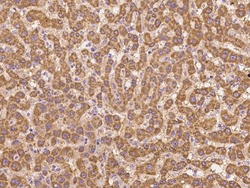
- Experimental details
- Immunohistochemical staining of human Bit1 in human liver with Bit1 Polyclonal Antibody (Product # PA5-118225, 1:500 dilution, formalin-fixed paraffin embedded sections).
Supportive validation
- Submitted by
- Invitrogen Antibodies (provider)
- Main image
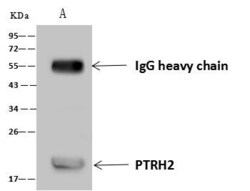
- Experimental details
- Bit1 Immunoprecipitation using: Lane A: 0.5 mg Jurkat Whole Cell Lysate 4 µL with Bit1 Polyclonal Antibody (Product # PA5-118225) and 60 μg of Immunomagnetic beads Protein A/G. Primary antibody: Bit1 Polyclonal Antibody, at 1:100 dilution. Secondary antibody: Goat Anti-Rabbit IgG (H+L) /HRP at 1:10,000 dilution. Developed using the ECL technique. Performed under reducing conditions. Predicted band size: 19 kDa. Observed band size: 19 kDa.
 Explore
Explore Validate
Validate Learn
Learn Western blot
Western blot